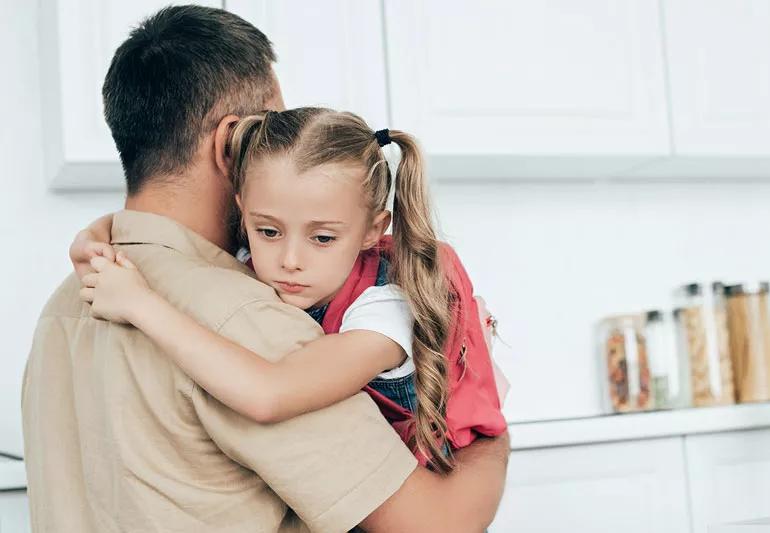How to best handle classroom conflict

Image content: This image is available to view online.
View image online (https://assets.clevelandclinic.org/transform/89d0b0ae-7e38-4e52-add2-61ed6cae82c3/childHateTeacher-1027677780-770x553_jpg)
Daughter hugging dad after upsetting day at school
Your child comes home from school, dramatically flings down their backpack on the floor and declares: “My teacher is mean!”
Advertisement
Cleveland Clinic is a non-profit academic medical center. Advertising on our site helps support our mission. We do not endorse non-Cleveland Clinic products or services. Policy
It’s normal to be at a loss for how to respond. But pediatric psychologist Vanessa Jensen, PsyD, recommends starting by lending an open ear.
“I think the first thing to do is just listen,” she says. “Let them talk on. Let the child tell their story without judgment — just let them get it on the table — with a lot of neutral comments like, ‘Uh huh’ or ‘Hmmm.’ Or ask neutral questions such as, ‘What happened then?’
The thing you don’t want to do is say, ‘Oh, she is so mean,’ or, ‘How could he say that to you? That was inappropriate.’ Just don’t go there.
Sometimes (like adults) kids just need to whine and complain. And know that you care enough to listen.
Have your child put their thoughts and feelings into words, Dr. Jensen says. This can help them problem-solve their way through the issue.
Then perhaps, if the issue persists, get the teacher’s side of the story.
“Sometimes it’s just clarifying with the teacher, and asking: ‘You know, Susan came home the other day and she was all upset about something. I was hoping you could help me understand what happened, as far as you’re concerned,’” explains Dr. Jensen. “It may be something very simple, innocuous — the teacher was having a tough day and gave a funny look, something totally benign.”
After getting more information, you can decide if there’s a need to sit down with everyone — parent, child and teacher — to get to the bottom of things.
Advertisement
If you have very young children, it’s important to remember that it’s easy for situations to be misinterpreted (especially if your child is very sensitive or anxious).
And remember that conflict can provide a learning opportunity for children of all ages.
Never ignore or completely dismiss your child’s concerns, especially if the issues keep recurring or are more serious. But Dr. Jensen also cautions not to intervene over every little thing, especially if you have an older student.
There comes a time when your child benefits from having the chance to handle what’s troubling them on their own.
“You want to start easing your way out of the role of managing everything for your child as they move into high school, so that more and more decisions are made (at least the decisions are talked about and thought about) with the student and the teacher, or the student and the guidance office,” she says.
“Obviously, parent input, asking questions and giving thoughts is important. But you eventually want them to start having them negotiate those things a lot more on their own, so they are prepared for life after high school.”
Often times, student-teacher conflict may be the result of a mismatch between the student’s style of learning and the teacher’s style of instruction, Dr. Jensen notes. But if you’re concerned about something inappropriate or troubling, it’s important to follow up on those concerns with the child’s teacher or school administrator.
Advertisement

Sign up for our Health Essentials emails for expert guidance on nutrition, fitness, sleep, skin care and more.
Learn more about our editorial process.
Advertisement
Vomiting and fevers are a hard no — other symptoms are a judgment call
Requesting information about your school’s safety plan is so important
Ideas for keeping children engaged when school is happening at home
Movement is also an important part of their school day
Because perfect isn’t possible during a pandemic
A guide for parents
Handling the talk without deflating self-esteem
Finding a balance between work + play
Type 2 diabetes isn’t inevitable with these dietary changes
Applying a hot or cold compress can help with pain
Pump up your iron intake with foods like tuna, tofu and turkey